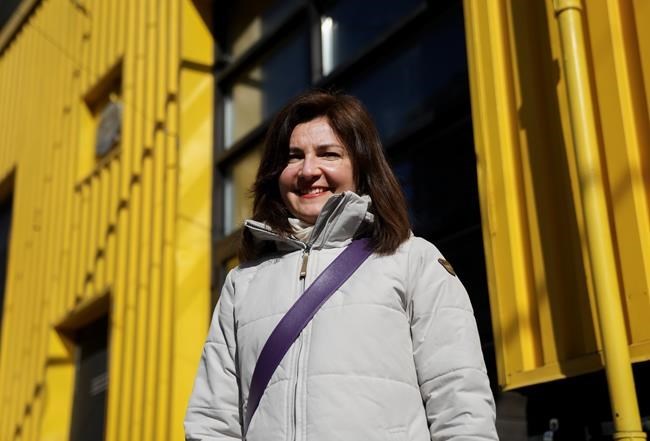TORONTO — Yuliia Kleban remembers waking up to a message from her manager on Feb. 24, 2022, telling her Russia had started invading her country.
A few minutes later, Kleban heard air-raid sirens go off in Lviv, the Ukrainian city where she used to live.
"It was a hard day," she said in a recent interview. "I started packing an emergency backpack. I started checking whether I can go in a walking distance to some shelter."
Kleban is among the more than 150,000 Ukrainians who made their way to Canada under a special program announced after the conflict began.
As the war enters a second year, many of those newcomers are assessing whether they should focus on establishing a life in Canada, hope to return to Ukraine one day, or move to another country entirely.
For Kleban, Canada holds the most appeal right now.
"For my future and for my family ... for my future kids, it is better to be in a safer country," she said. "Because in Ukraine we will always end up having a neighbour to the east that wants Ukrainians not to exist in this world."
The 37-year-old said she decided to apply to come to Canada to stay with extended family in Barrie, Ont., when Ottawa announced its special visa program for Ukrainians last March.
She spent about two months in the Czech Republic and four months in the United kingdom waiting for her Canadian visa before arriving in September. Her 40-year-old husband couldn't accompany her because of Ukraine's general mobilization law that bars men aged 18 to 60 from leaving the country.
Kleban, who was the director of an IT and business analytics program at the Ukrainian Catholic University, said she moved to Toronto about two months ago to work as project manager for a program that helps Ukrainian newcomers find jobs.
While she feels safe in Canada, she worries about loved ones in Ukraine.
"I'm hosted warmly by the country, by the people here." she said, adding she hopes her husband will eventually get an opportunity to join her.
"Everybody is very supportive and tries to use empathy as much as they can to understand the circumstances for Ukrainians now, the war that is continuing still."
Ihor Michalchyshyn, the executive director of the Ukrainian Canadian Congress – a non-profit umbrella organization of Ukrainian Canadian organizations – said Ukrainian newcomers are trying to figure out what path might work best for them in the future.
"People are looking to understand their options," he said.
"As people fled a year ago, they thought they would be able to go back in a couple of weeks and then it turned into a couple of months and now it's a year, right? And so I think none of us know."
Michalchyshyn said Ukrainians in Canada will be gathering for vigils, marches and demonstrations on Friday evening to mark the first anniversary of the war.
The war has had a huge effect on the Ukrainian Canadian community as many of its members, including those who have been in Canada for decades, still have family in Ukraine, he said.
"Most of us have some family connections, direct family connections or have been to Ukraine and understand it, been there, seen it, touched it," Michalchyshyn said. "It's shocking to see ... the tremendous violence by Russian invading forces on civilians."
Almost 1.4 million people, or four per cent of Canada's population, said at least one of their ethnic origins is Ukrainian in the 2016 census.
Ukrainian Canadians have donated more than $50 million to help people in Ukraine, Michalchyshyn said, and have also worked hard to help settle Ukrainian newcomers who have fled the war.
"We're seeing more and more people who are arriving. They don't know anybody, they don't know anything about Canada," he said.
"It's very difficult to find child care in Canada for everybody. It's very difficult to find affordable housing for everybody in Canada, so they are facing those same challenges as well."
The federal government has offered a temporary visa for Ukrainians fleeing the war and a three-year work permit, along with one-time payment of $3,000 per adult and $1,500 per child and a two-week hotel stay for those who need it.
Immigration Department spokesman Stuart Isherwood said Ottawa is working closely with provinces, territories and municipalities to support Ukrainian newcomers.
Ukrainians arriving under the temporary visa, as well as Ukrainian temporary residents who were in Canada when the war broke out, have access to settlement services typically only available to permanent residents, Isherwood said. Ottawa also launched an online portal for Canadian businesses to offer high-priority goods and services to support Ukrainians and organizations providing aid in Canada, he said.
"We will also continue working with settlement organizations and (non-governmental organizations) across the country to support Ukrainians and their family members before, during and after their arrival in Canada," he said.
"(The Immigration Department) is continuing to assess how our immigration programs can best support Ukrainian nationals now and in the future, including potential new pathways to permanent residence."
This report by The Canadian Press was first published Feb. 22, 2023.
Maan Alhmidi, The Canadian Press



